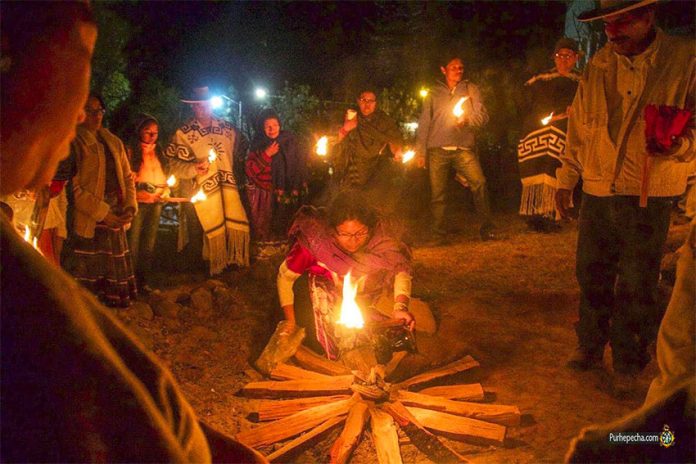The Chinese aren’t the only ones with an early spring New Year. Although based on a very different calendar, Mexico’s modern Purépecha people also celebrate a New Year’s tradition from the distant past.
Descendants of a pre-Columbian empire, the Purépecha today are concentrated in the northwest part of the state of Michoacán. Their calendar is a variant of the Mesoamerican calendar, a system that emerged with the Olmec civilization, passing through time and geography to be used in one form or another by the Mayans, Zapotecs, Toltecs and up to the Aztecs and Purépecha.
The stone representation of the Aztec version is one of the most photographed pieces in the Museum of Anthropology in Mexico City. Its use was cut off in 1521, replaced by the Christian calendar and Christian rituals.
Like its siblings, the Purépecha civil calendar consisted of 18 “months” of 20 days each for a total of 360 days. To keep the calendar aligned with the solar cycle, five days would be periodically added. But as they did not align with any month, those days were considered ominous.
In 1983, a group of Purépecha intellectuals and community activists reintroduced the use of the old calendar by celebrating its new year. This auspicious date is marked by the night when the constellation of Orion reaches its highest point in the sky. In the past, this meant it was time to make offerings to Kurhíkuaeri, the god of the Sun and of fire. This year that happens on the night of February 1-2.

The Purépecha new year is now celebrated with what is called the New Fire ceremony. This is also a Mesoamerican ritual, but originally it was performed once every 52 years, corresponding to the cycle of Pleiades; it was also the day when the civil and ritual calendars coincided.
Today, the New Fire ceremony has been repurposed so that the celebration of the new year can move from town to town in the territory once defined by the Purépecha Empire. A town receives the Old Fire from the community that guarded it during the previous year and then lights the New Fire. It then shelters and guards this fire until it is delivered to the next town to host the event.
The first modern Purépecha New Year ceremony was held at Tzintzuntzan, site of the area’s most famous archaeological site, with round platforms overlooking Lake Pátzcuaro. Since then, it’s become key to reasserting the identity of the Purépecha people as a community.
“Even though the New Fire ceremony is the most representative aspect of this indigenous people, it is one of reflection rather than religious or political in nature,” says Patricia Terán Escobar, a researcher at the National Institute for Anthropology and History (INAH). “Some of the objectives are to rescue the collective memory and all the cultural elements of the past, such as the ancient Purépecha tradition of verbally transmitting knowledge from one generation to another.”
This year, the New Fire/New Year ceremony will take place on February 1 in Capácuaro, which will receive the Old Fire from Cuanajo. Capácuaro is located north of the city of Uruapan, near Paracho.
Mexico News Daily
